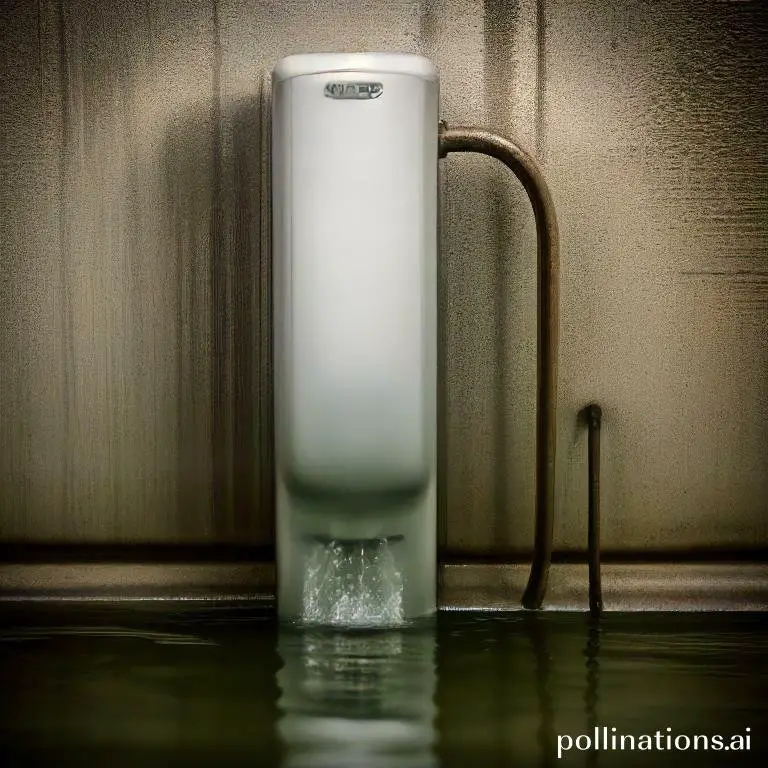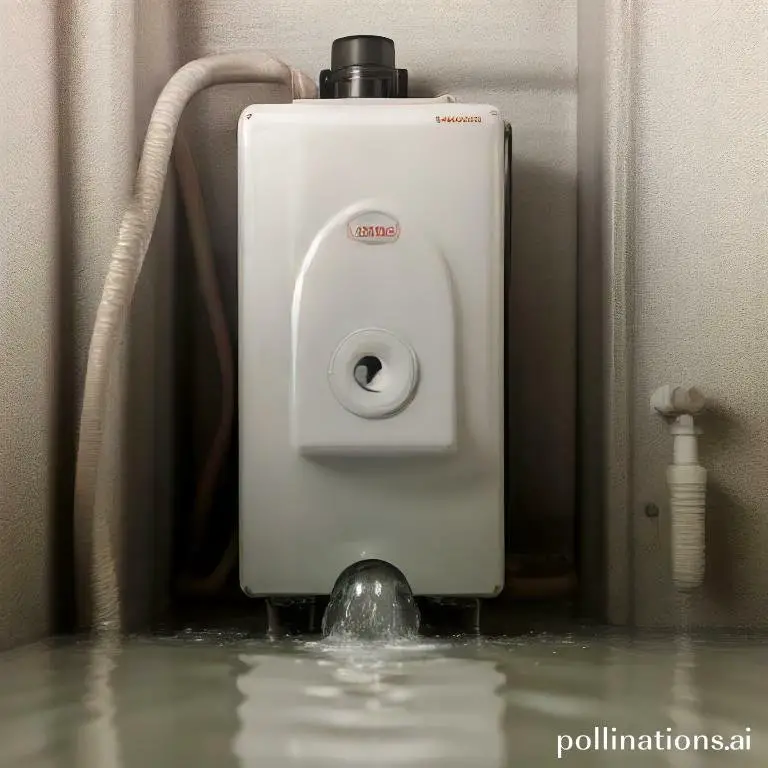
II. Signs of hidden leaks may include a decrease in hot water supply, unusual noises or odors, and visible water damage around the heater.
III. To fix hidden leaks in a water heater, it is important to first locate the source of the leak, which may require the help of a professional plumber, and then repair or replace the damaged components. Regular maintenance and inspections can also help prevent hidden leaks from occurring in the first place.
Water heaters are essential appliances in our homes, providing us with hot water for various purposes. Conversely, hidden leaks can lead to water damage, higher utility bills, and even potential health hazards.
It is crucial to learn how to identify these leaks and take appropriate measures to fix them. By mastering the signs of hidden leaks and implementing the necessary repairs, you can ensure the efficiency and longevity of your water heater, saving both money and resources.
Signs of Hidden Leaks in Water Heaters
1. Decreased hot water supply
If you have noticed a significant decrease in the amount of hot water your water heater is producing, it could be a sign of a hidden leak. Leaks in the water heater can cause hot water to escape, resulting in a decreased supply for your daily needs. This can be especially frustrating when you are expecting a steady flow of hot water for showers or washing dishes.
2. Unusual noises
If you hear strange noises coming from your water heater, such as banging or popping sounds, it may indicate a hidden leak. These noises can be caused by the build-up of sediment or minerals in the tank, which can lead to leaks over time. If you notice any unusual sounds, it’s important to have your water heater inspected to prevent further damage.
3. Water pooling around the base of the water heater
Finding water pooling around the base of your water heater is a clear sign of a hidden leak. This could be due to a faulty valve or a crack in the tank, allowing water to escape. It’s crucial to address this issue promptly to prevent water damage to your property and to ensure the proper functioning of your water heater.
4. Increased water bills
If you’ve noticed a sudden increase in your water bills without any changes in your water usage, it could be a result of a hidden leak in your water heater. Leaks can cause water to continuously flow even when you’re not using hot water, leading to higher water bills. Monitoring your water bills can help you identify any potential leaks and take necessary actions.
5. Rusty water
Seeing rusty or discolored water coming from your taps can be a sign of a hidden leak in your water heater. The presence of rust in the water indicates corrosion inside the tank, which can lead to leaks. If you notice rusty water, it’s important to have your water heater inspected and repaired to ensure the safety and quality of your hot water supply.
| Signs of Hidden Leaks in Water Heaters |
| 1. Decreased hot water supply |
| 2. Unusual noises |
| 3. Water pooling around the base of the water heater |
| 4. Increased water bills |
| 5. Rusty water |
Causes of Hidden Leaks in Water Heaters
Water heaters are essential appliances that provide hot water for various household activities. In contrast, hidden leaks in water heaters can cause significant damage if left unnoticed. Identifying the causes of these leaks is crucial in preventing costly repairs and ensuring the longevity of your water heater.
1. Corrosion
One of the primary causes of hidden leaks in water heaters is corrosion. Over time, the metal components of the water heater tank can corrode, leading to small cracks or holes. Corrosion is often accelerated by the presence of minerals and other impurities in the water supply. Regular maintenance and flushing of the water heater can help prevent corrosion and prolong its lifespan.
2. Loose connections
Another common cause of hidden leaks is loose connections. The fittings and pipes that connect the water heater to the plumbing system can become loose over time, resulting in water seepage. Inspecting and tightening these connections regularly can prevent leaks and ensure proper water flow.
3. High water pressure
Excessive water pressure can put strain on the water heater, causing leaks to develop. Indispensable to check the water pressure regularly and install a pressure-reducing valve if necessary. Maintaining a stable water pressure within the recommended range can prevent leaks and extend the life of your water heater.
4. Sediment buildup
Sediment accumulation at the bottom of the water heater tank can lead to corrosion and leaks. Minerals and debris present in the water supply settle at the bottom over time, creating a layer of sediment. Regularly flushing the water heater to remove sediment can prevent leaks and improve its efficiency.
5. Age of the water heater
As water heaters age, they become more susceptible to leaks. The wear and tear on the tank and components can cause cracks or weakened areas that allow water to escape. If your water heater is reaching its expected lifespan, it is advisable to consider a replacement to avoid potential leaks and water damage.
Steps to Identify Hidden Leaks in Water Heaters
Water heaters play a crucial role in providing hot water for various household activities. Despite this, over time, they may develop hidden leaks that can lead to water damage and increased energy consumption. To prevent these issues, it’s important to regularly inspect your water heater for any signs of leaks. Follow these steps to identify hidden leaks and take appropriate action:
1. Turn off the power supply
Before you begin the inspection process, ensure that the power supply to the water heater is turned off. This step is essential to ensure your safety and prevent any accidents during the inspection.
2. Shut off the water supply
Next, locate the water supply valve connected to your water heater and shut it off. By doing this, you will prevent any additional water from flowing into the tank, allowing you to accurately identify any existing leaks.
3. Drain the water heater
To get a clear view of the tank and its connections, you need to drain the water heater. Attach a hose to the drain valve and direct the other end to a suitable drainage area. Open the valve and let the water drain completely.
4. Inspect the tank and connections
Once the tank is drained, carefully inspect it for any signs of leaks. Look for water stains, puddles, or dampness around the tank and its connections. Pay close attention to the bottom of the tank, as leaks often occur in this area.
5. Check the pressure relief valve
The pressure relief valve is a vital component of the water heater that helps regulate the pressure inside the tank. Inspect this valve for any leaks or signs of damage. If you notice any issues, it may be necessary to replace the valve to ensure proper functioning.

Fixing Hidden Leaks in Water Heaters
Water heaters are an essential component of any household, providing us with hot water for various purposes. Although, even the most reliable water heaters can develop hidden leaks over time, which can lead to significant damage if left unaddressed. In this section, we will navigate five effective methods to fix hidden leaks in water heaters, ensuring the longevity and efficiency of your system.
1. Tighten Loose Connections
One of the primary causes of hidden leaks in water heaters is loose connections. Over time, the constant heating and cooling of the unit can cause fittings and valves to loosen, resulting in leaks. To fix this issue, carefully inspect all connections and use a wrench to tighten them securely. This simple step can prevent future leaks and ensure the proper functioning of your water heater.
2. Replace Damaged Pipes
Another common culprit of hidden leaks is damaged pipes. Corrosion, rust, or wear and tear can cause pipes to develop cracks or holes, leading to leaks. If you notice any signs of water leakage or discoloration around the pipes, it is crucial to replace them promptly. Consult a professional plumber to assess the extent of the damage and replace the damaged pipes with high-quality alternatives.
3. Flush the Water Heater
Sediment buildup can also contribute to hidden leaks in water heaters. Over time, minerals and debris can accumulate at the bottom of the tank, leading to corrosion and leaks. Flushing the water heater regularly can help remove this sediment and prevent leaks. Follow the manufacturer’s instructions or seek professional assistance to flush your water heater and maintain its optimal performance.
4. Replace the Pressure Relief Valve
The pressure relief valve is a crucial safety feature in water heaters, releasing excess pressure to prevent explosions. Notwithstanding, if this valve is faulty or worn out, it can cause leaks. If you notice water dripping from the pressure relief valve, it is essential to replace it immediately. Consult a professional to ensure the correct installation of a new pressure relief valve and eliminate any potential leaks.
5. Replace the Water Heater
If all other steps fail to address the hidden leaks in your water heater, it may be time to consider replacing the unit altogether. Over time, water heaters can deteriorate beyond repair, making replacement the most viable solution. Consult a professional plumber to assess the condition of your water heater and recommend a suitable replacement that meets your household’s hot water demands.
| Step | Method |
|---|---|
| 1 | Tighten loose connections |
| 2 | Replace damaged pipes |
| 3 | Flush the water heater |
| 4 | Replace the pressure relief valve |
| 5 | Replace the water heater |

Preventing Hidden Leaks in Water Heaters
Water heaters are an essential component of any household, providing hot water for various purposes. That being said, hidden leaks can cause significant damage and lead to costly repairs. By observing these preventative measures, you can ensure the longevity and efficiency of your water heater.
1. Regular maintenance
Maintaining your water heater is crucial to prevent leaks. Schedule regular inspections by a professional plumber to identify any potential issues. They will check for signs of corrosion, loose connections, or worn-out parts that could result in leaks. Additionally, they will flush the tank to remove sediment buildup, improving the heater’s performance.
2. Install a water softener
Hard water contains minerals that can accumulate inside your water heater, leading to corrosion and leaks. Installing a water softener can help remove these minerals, reducing the risk of leaks. It will also improve the overall efficiency of your water heater, saving energy and prolonging its lifespan.
3. Lower the water pressure
High water pressure puts unnecessary strain on your water heater, increasing the likelihood of leaks. Consider installing a pressure reducing valve to maintain an optimal pressure level. This will not only prevent leaks but also extend the lifespan of your water heater and other plumbing fixtures.
4. Insulate the water heater
Insulating your water heater can help prevent heat loss, reducing the workload on the unit and minimizing the chances of leaks. Use an insulation blanket or jacket specifically designed for water heaters. This will not only save energy but also protect your water heater from external elements that could cause leaks.
5. Replace an old water heater
If your water heater is old and showing signs of wear and tear, it may be time for a replacement. Older units are more prone to leaks and inefficiencies. Investing in a new, energy-efficient water heater will not only provide better performance but also give you peace of mind knowing that hidden leaks are less likely to occur.
Bottom Line
Hidden leaks in water heaters can cause serious damage to your home and increase your energy bills. To identify and fix these leaks, you should regularly inspect your water heater for signs of corrosion, rust, or moisture. You can also use a water meter or thermal imaging camera to detect leaks. Once you have identified the leak, you should turn off the power and water supply to your water heater and call a professional plumber to fix the issue. Regular maintenance and inspection of your water heater can help prevent hidden leaks and ensure that your water heater is functioning efficiently and safely.
By taking the necessary steps to identify and fix hidden leaks in your water heater, you can save money on your energy bills, prevent water damage to your home, and ensure that your water heater is functioning properly. Don’t wait until it’s too late to address hidden leaks in your water heater. Take action today to protect your home and your wallet.
Read More:
1. Impact Of Leaks On Water Heater Lifespan
2. Fixing Leaks In Commercial Water Heaters
















